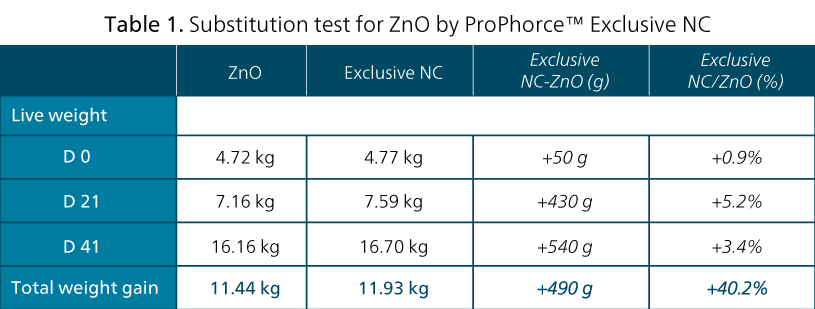The role of water in piglet weaning programs without zinc oxide
The imminent ban on the therapeutic use of zinc oxide (ZnO) in pig production in the EU is a consequence of the sanitary and environmental risks posed by the use of ZnO, by the Committee for Veterinary Medicinal Products (CVMP) in 2019. From the producer's perspective, its application does nothing but adding more complexity to the already highly demanding task of producing pigs efficiently and profitably.
At the moment, the pig production industry is still engaged in the progressive reduction of antibiotic use. ZnO has been an essential element in controlling weaning diarrhea, one of the main causes of high mortality in piglets. As of June 2022, therapeutic use of ZnO won’t be allowed anymore. This could have a great economic impact, it’s estimated that this withdrawal can cause an increase in mortality from post-weaning diarrhea of between 1.2% and 2.8%, a reduction of the average daily weight gain and an increase in the feed conversion rates. The average losses can climb to up to €3.35/piglet or €75/sow/year (Anprogapor, 2017)
Zinc oxide
Unlike antibiotics, the mechanisms of action that made this molecule an essential tool for controlling the secondary diarrhea in piglet at the weaning are unclear. The European Food Safety Agency (2017) points out that the mechanisms of action can be multiple and related to better behavior of the intestinal barrier, the modulation of immunity and microbiota, or a reduction of water and electrolytes loss into the intestinal lumen. All that adds complexity to design effective programs and/or alternatives and pushes the producers to broad-spectrum and profitable strategies that can support improvements in:
Biosecurity and farm management. The goal is to minimize and/or postpone the exposure of piglets to challenges in this very important stage.
Feeding programs aiming to maximize the transition and digestibility to solid diets and facilitate an efficient adaptation process.
Additives can support all these strategies. They can upgrade feed's digestibility, focus on improving the uptake of the feed, helping in the development and functionality of the intestine while favoring the rapid development of a healthy microbiota and preventing the proliferation of enteropathogens.
Water
Water is essential nutrient, animals consume it in greater quantity and more frequently than feed: In case of disease, unlike feed, animals always maintain water consumption. Water is an excellent vehicle for supplying additives and nutritional supplements to production animals. Furthermore, water systems offer the flexibility of dosage that allows adapting the treatments to the needs of the animals, also in the post-weaning period.
Short chain fatty acids
Short-chain fatty (SCFA) acids have been used in water solution programs for years, both in pig production and other species. The main reasons have to do with its acidifying power (pH reduction) and its ability to control bacterial proliferation. Both effects have a direct and positive impact on the digestion and absorption of nutrients and the control of the microbial load in the gut. Its use results in better growth and less incidence of diarrhea and enteric problems. SCFA have been a powerful complement to antibiotics and zinc oxide for the prevention and control of post-weaning diarrhea. The withdrawal of both treatments has only increased the importance of organic acids in the management of weanlings.
ProPhorce™ Exclusive NC
Perstorp understands the new and growing demand from European health regulations and consumers. Also the increasing productive potential of animals requires more complete and efficient solutions to support pig production to meet market demands more efficiently and profitably. ProPhorce™ Exclusive NC is Perstorp's water solution answer to the new needs of the pig farmer.
ProPhorce™ Exclusive NC combines organic acids, carefully selected phytochemicals for superior bacterial control, and butyrins in one single solution. Butyrins exert their positive action in the gut by boosting intestinal development and maturation, strengthening tight junctions, barrier function, and immunomodulation. Therefore, ProPhorce™ Exclusive NC protects and supports piglet gut health all along the gastrointestinal tract.
ProPhorce™ Exclusive NC was tested under field conditions. In a recent field trial carried out in Spain, 202 male piglets were monitored and divided into 2 groups. One group received the standard feeding program, which still included ZnO (until day 21), other group did not receive any ZnO but ProPhorce™ Exclusive NC through water from up to 41 days post-weaning. (See the results as live weight and weight gain in table 1).
Table 1: Substitution test for ZnO by ProPhorce™ Exclusive NC

The animals that received ProPhorce™ Exclusive NC achieved a larger weight gain in the two post-weaning phases than the piglets in the ZnO program. When comparing both groups' results, it is interesting to note that the best piglet performance on the water treatment program occurs in the first 21 days after weaning. Those three weeks after weaning are the most critical in the whole nursery phase. Furthermore, the productive behavior of the piglets that received ProPhorce™ Exclusive NC was better in the second phase as well (days 21 to 42). In both treatment groups, the incidence of diarrhea was very low and there was no difference among them.
Conclusions
Water is an excellent vehicle to complement strategies that support gut health and integrity while reducing the use of ZnO in pig production. Gastric acidification, entero-pathogen control, and gut integrity and development are also relevant aspects that these nutritional strategies must support. Based on its unique composition, ProPhorce™ Exclusive NC helps to achieve these goals efficiently.